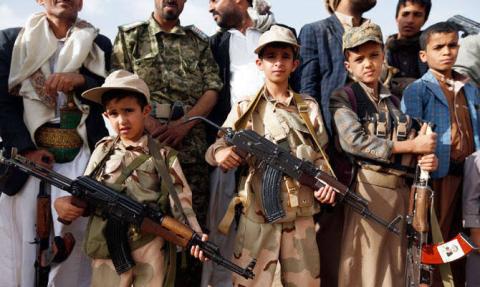Yemen: Key Human Rights Concerns for UN Envoy


The new United Nations special envoy for Yemen, Hans Grundberg, should make human rights concerns front and center as he begins his work, Human Rights Watch said today. The Swedish diplomat succeeds Martin Griffiths, who held the role from 2018 to 2021.
As Grundberg begins his role, the impact of the conflict on the humanitarian and human rights situation should be at the heart of his talks with the parties to the conflict. By mid-2021 the armed conflict in Yemen had killed almost a quarter of a million people, resulting in the world's worst humanitarian crisis, and contributed to serious human rights abuses with no end in sight.
More than six years into the conflict, the humanitarian situation has been exacerbated by the parties’ repeated laws-of-war violations. Grundberg should press all parties to end human rights abuses and laws-of-war violations and provide accountability for past abuses and atrocities by all sides.
“There can be no lasting solution in Yemen so long as parties to the conflict are free to trounce the human rights of Yemenis without constraint,” said Afrah Nasser, Yemen researcher at Human Rights Watch. “Grundberg should make ending abuses and creating meaningful accountability for all parties to the conflict a central focus of his work.”
The following are some key immediate humanitarian and human rights concerns documented by Human Rights Watch, the UN Group of Eminent Experts on Yemen, and other local and international rights groups.
Detention
Investigations by Human Rights Watch, and other rights groups have identified widespread abuses such as arbitrary detention, forcible disappearance, and ill-treatment and torture in detention facilities controlled by parties to the conflict. Houthi forces detain and prosecute dissidents, including religious minorities, women, and journalists. The UAE-backed Southern Transitional Council (STC) has been responsible for arbitrary detentions and enforced disappearances, and has held detainees in extremely overcrowded conditions despite health risks stemming from the Covid-19 pandemic, Human Rights Watch found.
In March 2020, Human Rights Watch documented abuses by Saudi military forces and Saudi-backed Yemeni forces against civilians in al-Mahra governorate, in eastern Yemen, including torture, forced disappearances, and arbitrary detention. The Yemeni government has also been responsible for detention-related abuses, including torture and rape of migrants from the Horn of Africa.
Unlawful Attacks
Houthi attacks against civilian sites have put civilians at great risk in the ongoing battle for Marib, including at least two million internally displaced people. Human Rights Watch found that Houthi rockets landed in internally displaced people’s camps around Marib in March 2021. Houthi forces have also repeatedly fired artillery indiscriminately into Yemeni cities such as Taizz and Hodeida, and launched indiscriminate ballistic missiles into Saudi Arabia, including civilian sites such as Riyadh’s international airport. Human Rights Watch has also documented scores of apparently unlawful coalition attacks since March 2015.
Potential Red Sea Environmental Disaster
A deserted supertanker moored off Yemen’s coast risks spilling over a million barrels of crude oil into the Red Sea. The UN says a spill would have catastrophic environmental and humanitarian consequences, including destroying livelihoods and shutting down the port of Hodeida, a lifeline for millions of Yemenis who depend on commercial imports and humanitarian aid. Despite this risk the Houthi authorities have not allowed UN experts to secure the tanker.
Migrants
African migrants in Yemen are among those most affected by the conflict. In March, Human Rights Watch documented the death of scores of African migrants in a fire in a Houthi-controlled detention center. In 2020, Houthi and Saudi forces killed and injured dozens of African migrants in the mountainous border area between Saudi Arabia and Yemen. Satellite imagery reviewed by Human Rights Watch showed widespread destruction of over 300 tents and houses.
Collapsing Economy
Yemen’s economy has been ravaged by years of conflict. A recent unannounced decision by the Saudi Labor and Social Development Ministry to terminate or bar renewal of the contracts of Yemeni workers’ who live and work in the kingdom puts at risk the largest source of foreign exchange in Yemen and also puts at risk hundreds, possibly thousands, of Yemenis forced to return to the humanitarian crisis in Yemen. The Saudi authorities need to suspend this decision and allow Yemenis to remain in Saudi Arabia with the ability to work.

Aden — Yemen Airways has announced new updates to its ticket cancellation (VOID) policy, introducing financial penalties on travel agents in…

Geneva – The United States announced that Yemen will not be among the countries benefiting from a new $2 billion funding pledge for United Na…

Paris — The French humanitarian organization Acted announced that it has delivered cash assistance to nearly 89,000 people affected by displa…